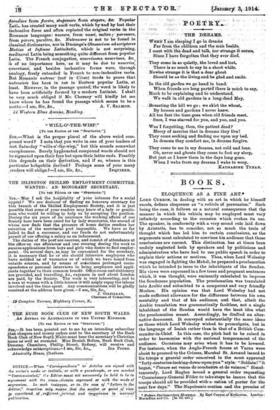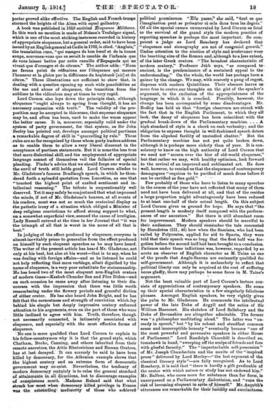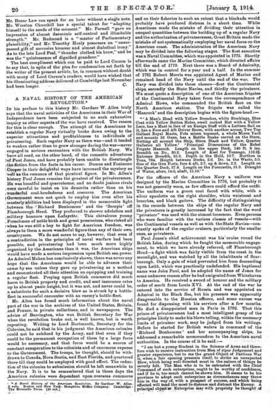ELocitrENcE AS PINE ART.* Loan Cuszom, in dealing with an
art in which he himself excels, defines eloquenoe as "a vehicle of persuasion." Such being the case, it follows as a natural consequence that thp manner in which.. this vehicle may-be einployed. Must vary infinitely- according to the occasion .which evokes its use. The speaker, in conformity with a very pound role .laid down by Aristotle, has to consider, not so much the, train of thought which. has led, him to. certain conclusion's, as the argumentsmost calculated to convince his audience that those conclusione are- correct. This distinction- has at times been unduly neglected both by speakers and by .politicians and administrators who have had to use public speech in order to explain their actions or motives. Thus, when Lord Wolseley was engaged in fighting the Mahdi, lie prepared& proclaim ation which be intended to issue to the inhabitants of the Soudan. His views were expressed in a few terse and pregnant sentences which; it wile thought;- were 'eminently calculated to impress the Soudanese population. The- proclamation_ was translated Into Artibie and submitted to a. competent and very friendly Moslem.' His opinion was that Lord Wolseley had not made sufficient allowance for the .difference between hie own mentality and that of his audience, and that, albeit the Arabic translation was- grammatically faultless, not a single inhabitant of the Soudan would have the least idea what the proclamation meant. Aaeordingly, he dtaf led an alter- natite. document. It conveyed substantially the same ideas as those. which Lord Wohieley wished. to: promulgate, but in the-language of Isaiah rather than in that of a British Com- mander-M.Ohief. In this cage, the pitch had to- be raised in order td. harnionise. with the national temperament of the audience; Occasions may arise when it. has to be lowered. For instance, when the -Anglo-French forces. Si Varna were about to -proceed-to the Crimea, Marshal St. Arnaud. Maned to fiistriMptilr gener'al'- order eaneeived in the most. approved d'fortY-eenturieisdook irig-doWmnponyon-''' " Soldate!" it begin; "l'ireure set Venue slecombattre etde.vainere." Siniul- titneetudy, Lord Raglan issued- a. general order requeiting "Contmissary-DetteralFilder.to takeeteps to insure that tile trooPe'slitaild all- be provided With- a,- uatiok Of . porter for- the next' few daye." • The,Napolesmic oration awl the promise of
_ - . -
'SWAT Pstrimr EiFi•CutLeatos.
porter proved alike effective. The English and French troops stormed the heights of the Alma with equal gallantry.
A book wee published in 1818 entitled .gloquenre dfilidatre. In this work no mention is made of Nelson's Trafalgar signal, which is one of the most striking instances recorded in history of appropriate eloquence, but a general order, said to have been iesned byan English general at Cadiz in 1702, is cited. "Anglais," the translation runs, "qui mangez de bon bteuf at dale bonne +tonne, souvenes-vons que cc serail le cemble de l'infainie que de Tons kisser battre par cette canaille d'Espagnois qui we vivent que d'oranges et de citrons." The author adds : "Noss ne ferons point de refiezions sur l'eloquenee qui mesure l'honneur et la gloire par la difference du beefehreek [sec) at du citron." These illustrations are sufficient to show that, in dealing with a question opening up such wide possibilities as the use and abuse of eloquence, the transition from the
sublime to the ridiculous may at times be very rapid- ,
Lord Curzon also lays down the principle that, although. eloquence "ought always to spring from thought, it has no necessary connexion with truth." The. validity ,of the pro- position may be accepted in this sense, that appraise eloquence may be, and pften has been, used to make the worse appear the better cause. It is, moreover. especially valid under the eystem of party government, for that system, as Sir John Seeley has pointed out, develops amongst political partisans 4 remarkable degree of skill in" quarrelling by rule." These -rules are so far recognized by them whom party leaden; address as to enable them to allow a very liberal discount in the . acceptance of partisan statements. But it is none the less true that mere dialectical skill and the employment of appropriate language cannot of themselves veil the fallacies of special pleading. Pindar'n advice that we should forge our words on the anvil of truth still holds good. Lord Carson alludes to Mr. Gladstone's famous Bradlaugh speech, in which he then- dered forth a splendid quotation from Lucretius, as one that " touched the highest point of exalted sentiment and in- tellectual reasoning." The tribute is unquestionably well deserved. Yet it may safely be conjectured that what impressed the minds, if not of Mr. Gladstone's hearers, at all events of his readers, most was not so much the oratorical display as the pathetic irony of a situation which obliged a Minister of deep religious convictions to afford strong support to what, on a somewhat superficial view, seemed the cause of irreligion. Lady Russell entered at the time in her Journal that "it was the triumph of all that is worst in the name of all that is best."
In judging of the effect produced by eloquence, everyone is almost inevitably prone to generalize from the effect produced on himself by such eloquent speeches as he may have heard. The writer of the present article has heard Mr. Gladstone, not only at his best, but also at his worst—that is to say, when he was dealing with foreign affairs—and as he listened he could not help reflecting that mere verbiage, albeit dignified by the name of eloquence, is a very poor substitute for statesmanship. He has heard two of the most eloquent non-English orators of modern times—Keahub Clhunder Sen and Pere Didon—and on each occasion he came away after listening to their dis- courses with the impression that there was little worth remembering under the flowery periods and graceful diction of either orator. He has also heard John Bright, and he has felt that the earnestness and trtrength of conviction which-lay behind his simple but deeply impressive oratory enforced attention to his arguments, even on the part of those who were little inclined to agree with him. Truth, therefore, though not necessarily connected, is intimately associated with eloquence, and especially with the most effective forms of
eloquence. '
No one iv more qualified than Lord Curzon to explain to his fellow-countrymen why it is that the grand style, which Chatham, Burke, Canning, and others inherited from their remote ancestors., the Attie Rhetoricians and Roman Orators, has at last decayed: It can scareely be said to have been killed by democracy, for the Athenian example 8110W13 that the highest oratory and an extreme form of democratic government may co-exist. Nevertheless, the tendency of modern democracy certeinly is to raise the general standard of mull/wiggle inOl directions, but to discourage examples conspicuous merit. Madame Roland said that what *ruck her moat when ,dgmooracy killed privilege in France was -the asbaending, mediocrity' of those who achieved- chieved political politieal prominence. "Ells passe" alle.aaid, "tout as qua l'imagination pent se presenter et eels. dens tens lee degree." Of all the special causes enumerated by Lord Curzon as fatal to the survival of the grand style the modern practice of reporting speeches is perhaps the most important. Bo com- petent a judge As Lord Rpeebery has declared that "eloquence and stenography urn not of congenial growth?' Undue attention to the niceties of style and irrelevance were the besetting sins of the Roman and,althongh toeless extent, Of the later Greek orators. -" The broadest characteristic of modem oratory," Professor Jebb .qaya, "an compered to ancient, is the predominance of a sustained appeal to the - understanding." On the whole, the world has perhaps been a gainer by the change. We may, with scarcely a pang of regret, dispense with modern Qnintilians. Their absence leaves up more free to centre.our thoughts on the gist of the speaker's argument, to the exclusion of the appropriateness of the language in which it is couched: Possibly, however, the change him been accOmpanied by some disadvantages. Mr. Ftodley his told xis that "foreign observers are struck vrith the fact that in the English Parliament, to which they all look, the decay of eloquence has been coincident with the gradual break-deem of the Parliamentary machine. . . . A. high standard of style is a cheek on rash verbosity; and the obligation to express thought in well-fashioned speech deters from the slipshod facility of unstudied chatter." But the Parliamentary machine has not yet quite broken down, although it is perhaps more rickety than of yore. Ibis con- solatory to know on the high authority of Lord Curzon that we need not "mourn over the bier of old-world eloquence," but that rather we may, with healthy optimism, look forward to the revival of an improved and sublimated art. He does well, however, to remind us that the eloquence of contemporary demagogues "requires to be purified of much dross before it
can be certified as fine gold." *
Few probably of those who have to listen to many speeches in the course of the year have not reflected that many of them need not have been delivered at all, and that of the residue a large proportion might advantageously have been reduced to at least one-half of their actual length. On this subject Lord Curzon gives us ground for hope. He says that "the present length is modesty itself compared with the perform- ances of our ancestors." But there is Still abundant room for improvement. Modern speakers should be merciful to their audiences. They should' rethember the tale recounted by Herodotas (III., 46) how when the SLUM= 8, who had been exiled by Polyemtes, applied for aid to Sparta, they were told that their speech was so long that the first half was for- gotten before the second half laid been brought to a conclusion. Patience under these inflictions was, however, regarded by so acute an observer of English character as H. Tame as one of the proofs that Auglo-Saxons are eminently qualified for self.government. Although it is melancholy to reflect that political liberty can only be acquired at the cost of suffering bores gladly, there may perhaps be some force in H. Taine's
' argument.
Not the least valuable part of Lord Curzon's lecture con- sists of appreciations of contemporary speakers. He sums up their special characteristics in a few singularly felicitous phrases. Amongst English speakers, be very rightly gives the palm to Mr. Gladstone. He commends the intellectual power of the late Duke of Argyll and the satire of Sir William Harcourt. His sketches of Lord Salisbury and the Duke of Devonshire are altogether admirable. The former was "a philosopher meditating aloud." The latter was "un- ready in speech," but "by his robust and steadfast common sense and incorruptible honesty "eventually became "one of the most powerful and persuaeive speakers in either House of Parliament." Lord Randolph Churchill is described as, tomahawk in hand, "sweeping off the scalps of friends and foes with gleeful ferocity." The "imperturbable self-possession" of Mr. Joseph Chamberlain and the merits of the "inspired. prose" delivered by Lord Morley—" the last exponent of the classical literary style"—are frilly recognized. As to Lord Rosebery, it is said that "there is hardly a gift predicable of the orator with which nature or study has riot endowed him." Mr. Balfour, who cares more for substance than for forni; ie unserpassed as a Parliamentary dialectician, and "rues the risk of becoming eloquent in spite of himself," lifr.Asquithlt utterances are remarkable for their lucidity and succinctness.
Mr. Boner Law can speak for an hour without a single note. Mr. Winston Churchill has a special talent for "adapting himself to the needs of the mement." Mr. Parnell " gave an impression of almost daemonic self.tontrol and illimitable strength.", Mr. Redmond is a "master of Parliamentary planaibility," and Mr. Timothy Healy possesses 'an " unsur- passed gift of oorroaive humour and. almoet diabolical irony." As to the late Lord Peel, "thunder clothed his brow," and he Was the " quintessence of dignified grandeur." The best compliment which can be paid to Lord Curzon is to say that, in spite of the plea for condensation set forth by the writer of the present article. Le, in common without doubt with many of Lord Ourzon's readers, would have wished that his illuminating addreas delivered at Cambridge last November




















































 Previous page
Previous page